 Christian Williams is an artist from Lawrence, Kansas, see website. Kansas is situated, whichever way you see it, in the middle of the U.S. Christian Williams will be indexed under the heading Midwest. It’s obvious the correct geographical heading, and not an entirely wrong placement for Christian Williams musically. It’s also in the "western" his music should be placed. Christian Williams moved to Lawrence, Kansas in 2007. Prior to that, he lived for some years in Milwaukee. Originally, he grew up outside of Chicago. As mentioned in the introduction to this article series, labels are used both diligently and resourcefully in the genre. There are some similarities with Those Poor Bastards (evil death country) and Sons of Perdition (apocalyptic death country) even though they represent a somewhat different type of music. If I may contribute with a label to the already abundant flora, I would label Christian Williams "dark minimalistic death country". Other labels are "gothic prairie country", "western folk" or "gothic folk”. Christian Williams is however not a man you can determine the position of by a simple cross in a coordinate system. He is a bit of a modern Renaissance man. Besides his work, he writes both music and makes paintings. Previously, he has written short plays and poetry with some success. In addition to his "solo career" he is the lead singer and guitarist of the three-piece band Organ Loaners (Kinks-inspired garage-rock). In the band, he plays music with a harder and rougher edge. The band has made some gigs and plans to release an EP. However, this article will focus on Christian Williams as a solo artist in the "gothic country" genre. The first thing that strikes you as a listener is how timeless the music is. The music can’t be placed in time in the same way as other contemporary music in the genre. Within the "gothic country" genre, Christian Williams is the primus inter pares. Christian Williams is listed on virtually every reputable list of recommendations and each initialized thread about "gothic country" on various online music forums. It took a while before I realized the full extent of his talent. Today, he undoubtedly belongs to my absolute favorites. Other artists can be a little weary - at least periodically - but Christian Williams’ music never wear out. The suggested compilation below is highly rationed. It took a long time to compile, because there are so many great songs to choose from. I play the compilation again and again. I never get tired of it.
Christian Williams is an artist from Lawrence, Kansas, see website. Kansas is situated, whichever way you see it, in the middle of the U.S. Christian Williams will be indexed under the heading Midwest. It’s obvious the correct geographical heading, and not an entirely wrong placement for Christian Williams musically. It’s also in the "western" his music should be placed. Christian Williams moved to Lawrence, Kansas in 2007. Prior to that, he lived for some years in Milwaukee. Originally, he grew up outside of Chicago. As mentioned in the introduction to this article series, labels are used both diligently and resourcefully in the genre. There are some similarities with Those Poor Bastards (evil death country) and Sons of Perdition (apocalyptic death country) even though they represent a somewhat different type of music. If I may contribute with a label to the already abundant flora, I would label Christian Williams "dark minimalistic death country". Other labels are "gothic prairie country", "western folk" or "gothic folk”. Christian Williams is however not a man you can determine the position of by a simple cross in a coordinate system. He is a bit of a modern Renaissance man. Besides his work, he writes both music and makes paintings. Previously, he has written short plays and poetry with some success. In addition to his "solo career" he is the lead singer and guitarist of the three-piece band Organ Loaners (Kinks-inspired garage-rock). In the band, he plays music with a harder and rougher edge. The band has made some gigs and plans to release an EP. However, this article will focus on Christian Williams as a solo artist in the "gothic country" genre. The first thing that strikes you as a listener is how timeless the music is. The music can’t be placed in time in the same way as other contemporary music in the genre. Within the "gothic country" genre, Christian Williams is the primus inter pares. Christian Williams is listed on virtually every reputable list of recommendations and each initialized thread about "gothic country" on various online music forums. It took a while before I realized the full extent of his talent. Today, he undoubtedly belongs to my absolute favorites. Other artists can be a little weary - at least periodically - but Christian Williams’ music never wear out. The suggested compilation below is highly rationed. It took a long time to compile, because there are so many great songs to choose from. I play the compilation again and again. I never get tired of it.
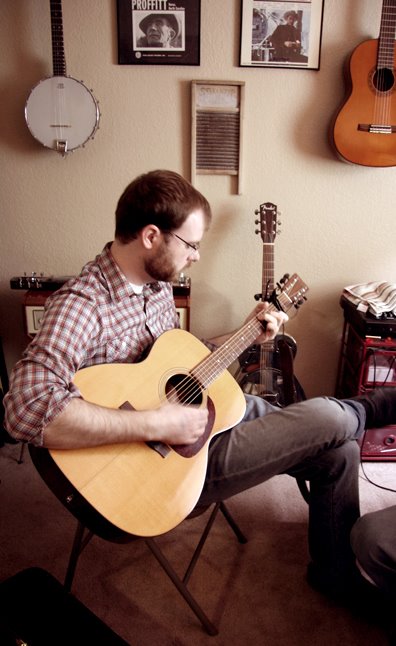 As we have seen abundantly clear in this article series the injustices in the "gothic country" genre are numerous, extensive and outrageous. But the question is if not the case of Christian Williams takes the first prize. The impact of his music is not at all commensurate with his talent and exquisite production, on the contrary, it’s rather in inverse proportion. This circumstance upsets me more than usually is the case. Christian Williams takes this calmly. In an interview in autumn 2007 for the excellent site Sepiachord (whose motto is "Music Now for a Past That Never Was") Christian Williams develops his views: "I'm just trying to make ends meet so that I can continue to make and release more music. And while it's been frustrating at times, it helps to remind myself that I'm not trying to make a career out of music – I'm just trying to share my songs with folks who want to listen." In an email Christian Williams develops his views further: "I realize that there are some musicians out there who want to make a living making music, and find it difficult to do that on the minimal royalties from digital sales, but that isn’t me. I have a full-time day job that I love as editor-in-chief of a magazine called Utne Reader, and I work on art and music in my spare time. I’ve never been interested in making a living off my music or my art. In fact, I purposely detach my passion for creativity from money because I believe it compromises the pure expression I’m after. Once you depend on your art to make a living, you inevitably start shaping your art to fit the parameters of what your paying audience wants – not what you want. My philosophy is this: stay true to pure expression. If people like what you produce and want to pay for it, that’s fantastic. If not, I don’t let it bother me – the satisfaction of expressing myself creatively is gratifying enough." I have often had cause to reflect on Americans' interest in their own musical heritage. It completely abounds with talent, brilliance and originality in the U.S. I never cease to be amazed by the lack of interest in genuine quality. The average American instead prefer to listen to radio-friendly so called “dumb country” or something even worse like "pop-country". Why not settle for the best, for example gothic country, instead? This question will not be answered within the scope of this article. In the email Christian Williams describes how he got into "gothic country": "I originally started writing what has become known as “gothic country” back in 2005. I found myself heavily influenced by dark old-time folk and blues music, and artists like Dock Boggs and Skip James became my musical touchstones. I soon discovered that there were other contemporary musicians mining the same dark spaces of Americana (The Handsome Family and Slim Cessna’s Auto Club were my favorites), and listening to their take on that kind of music further motivated me as a songwriter. I think it was in 2007 that my music started to become associated with the specific genre of “gothic country,” and I started to see the term used a lot more to describe what I’d been listening to for years up to that point."
As we have seen abundantly clear in this article series the injustices in the "gothic country" genre are numerous, extensive and outrageous. But the question is if not the case of Christian Williams takes the first prize. The impact of his music is not at all commensurate with his talent and exquisite production, on the contrary, it’s rather in inverse proportion. This circumstance upsets me more than usually is the case. Christian Williams takes this calmly. In an interview in autumn 2007 for the excellent site Sepiachord (whose motto is "Music Now for a Past That Never Was") Christian Williams develops his views: "I'm just trying to make ends meet so that I can continue to make and release more music. And while it's been frustrating at times, it helps to remind myself that I'm not trying to make a career out of music – I'm just trying to share my songs with folks who want to listen." In an email Christian Williams develops his views further: "I realize that there are some musicians out there who want to make a living making music, and find it difficult to do that on the minimal royalties from digital sales, but that isn’t me. I have a full-time day job that I love as editor-in-chief of a magazine called Utne Reader, and I work on art and music in my spare time. I’ve never been interested in making a living off my music or my art. In fact, I purposely detach my passion for creativity from money because I believe it compromises the pure expression I’m after. Once you depend on your art to make a living, you inevitably start shaping your art to fit the parameters of what your paying audience wants – not what you want. My philosophy is this: stay true to pure expression. If people like what you produce and want to pay for it, that’s fantastic. If not, I don’t let it bother me – the satisfaction of expressing myself creatively is gratifying enough." I have often had cause to reflect on Americans' interest in their own musical heritage. It completely abounds with talent, brilliance and originality in the U.S. I never cease to be amazed by the lack of interest in genuine quality. The average American instead prefer to listen to radio-friendly so called “dumb country” or something even worse like "pop-country". Why not settle for the best, for example gothic country, instead? This question will not be answered within the scope of this article. In the email Christian Williams describes how he got into "gothic country": "I originally started writing what has become known as “gothic country” back in 2005. I found myself heavily influenced by dark old-time folk and blues music, and artists like Dock Boggs and Skip James became my musical touchstones. I soon discovered that there were other contemporary musicians mining the same dark spaces of Americana (The Handsome Family and Slim Cessna’s Auto Club were my favorites), and listening to their take on that kind of music further motivated me as a songwriter. I think it was in 2007 that my music started to become associated with the specific genre of “gothic country,” and I started to see the term used a lot more to describe what I’d been listening to for years up to that point."
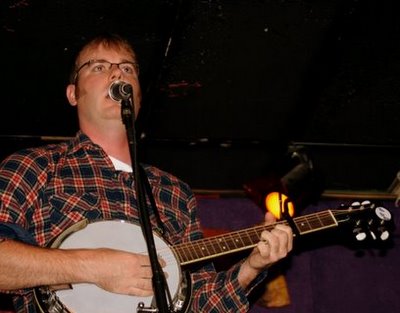 Christian Williams is self-taught on both guitar and banjo. He started with the guitar. In the email, he writes: "After playing just guitar on the first couple albums, I decided I wanted to expand my sound. I had never played the banjo before, but knew that if I stuck with it I’d be able to teach myself how to play the same way I taught myself how to play guitar." This means that Christian Williams can choose between guitar and banjo in the accompaniment. But what determines if it’s going to be guitar or banjo? "And honestly, the only basis I use to decide when to use one or the other is if I’m working on a recording that I want to sound balanced and realize that I’ve written more guitar songs than banjo songs or vice versa. While I made a conscious decision to create a banjo-centric album with 30 Minutes, the banjo (and now the piano) is just extra tools I like to use to expand my sound." he writes in the email. He plays on a "trusty old Martin guitar" and a "zeppified Deering Goodtime banjo". Christian Williams has a special picking technique and plays guitar and banjo in the same way. Most guitarists and banjo player picks with several fingers on the right hand. Christian Williams picks only with the inside of the right thumbnail. The thumb goes fast as a wing of a hummingbird (he is also known as Ol 'Crazy Thumb by his friends). Listen, for example, to Summer Breeze or Bison Jump. In the email Christian Williams describes how come he plays on a Martin guitar: "The first guitar I used when I started playing live shows was a small mahogany-bodied Martin that was great for practicing in my house, but pretty mediocre when it came to projecting in a live venue. I knew I needed to find something with a fuller sound and a deeper low end. So, I went to a small guitar shop in Milwaukee that specializes in repairing old Martin guitars and saw one hanging there with a noticeable crack right down the center of the body. The luthier explained that the previous owner had mistreated it by leaving it sit out next to the heater in his apartment and the wood top had dried up and split down the middle. The luthier was able to repair it, but couldn’t do anything to get rid of the visible scar. I, on the other hand, was directly attracted to the imperfection, and asked to play it. The first few notes boomed out and it was heavenly; it was the exact sound I was looking for and I immediately traded in my brand new, perfect mahogany Martin for that beat up 1993 model that no one else wanted. I soon discovered that its darker tone was the perfect complement to my voice."
Christian Williams is self-taught on both guitar and banjo. He started with the guitar. In the email, he writes: "After playing just guitar on the first couple albums, I decided I wanted to expand my sound. I had never played the banjo before, but knew that if I stuck with it I’d be able to teach myself how to play the same way I taught myself how to play guitar." This means that Christian Williams can choose between guitar and banjo in the accompaniment. But what determines if it’s going to be guitar or banjo? "And honestly, the only basis I use to decide when to use one or the other is if I’m working on a recording that I want to sound balanced and realize that I’ve written more guitar songs than banjo songs or vice versa. While I made a conscious decision to create a banjo-centric album with 30 Minutes, the banjo (and now the piano) is just extra tools I like to use to expand my sound." he writes in the email. He plays on a "trusty old Martin guitar" and a "zeppified Deering Goodtime banjo". Christian Williams has a special picking technique and plays guitar and banjo in the same way. Most guitarists and banjo player picks with several fingers on the right hand. Christian Williams picks only with the inside of the right thumbnail. The thumb goes fast as a wing of a hummingbird (he is also known as Ol 'Crazy Thumb by his friends). Listen, for example, to Summer Breeze or Bison Jump. In the email Christian Williams describes how come he plays on a Martin guitar: "The first guitar I used when I started playing live shows was a small mahogany-bodied Martin that was great for practicing in my house, but pretty mediocre when it came to projecting in a live venue. I knew I needed to find something with a fuller sound and a deeper low end. So, I went to a small guitar shop in Milwaukee that specializes in repairing old Martin guitars and saw one hanging there with a noticeable crack right down the center of the body. The luthier explained that the previous owner had mistreated it by leaving it sit out next to the heater in his apartment and the wood top had dried up and split down the middle. The luthier was able to repair it, but couldn’t do anything to get rid of the visible scar. I, on the other hand, was directly attracted to the imperfection, and asked to play it. The first few notes boomed out and it was heavenly; it was the exact sound I was looking for and I immediately traded in my brand new, perfect mahogany Martin for that beat up 1993 model that no one else wanted. I soon discovered that its darker tone was the perfect complement to my voice."
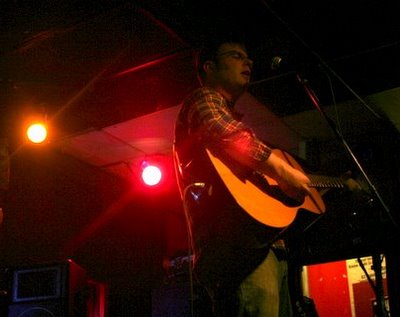 Christian Williams is 100% authentic. While many other artists/bands wannabes seek attention through well-rehearsed poses, mannerisms and bombastic expressions Christian Williams works with smaller but equally effective means of expression. Some examples: In the song "Red" he repeatedly whispers "red" (blood) in the very morbid lyrics. "The Long Drop" ends with the trapdoor opens under the condemned. In the very tragic, "Sad Song Of Sequin Island" his dark baritone goes over in a moaning and groaning that leaves no person with a normal set of emotions untouched. But, it's not just the vocals and the lyrics that indicate the emotional state. In the song "The Barn By The Creek" he just plays a little harder in the chord in the middle of the song (which leads to an disproportionate big effect). In the song "The Trail", the feeling of presence is so strong that I imagine myself - thirsty as a birch tree in a window box - in a slowly shaking wagon on the prairie. When this is the case then the artist has managed to convey the mood. Christian Williams is both creative and productive. Especially between the years 2006-2008 (five albums were released). While he recorded an album, he had already begun writing new songs for the next album. In the email Christian Williams describes how his songwriting process looks like: "For me, the arrangement and chords always come first. I approach songwriting the same way I do my paintings. It starts as stream of consciousness, doing my best not to think too much. When I stumble across a chord progression I like, I play it over and over until I start to pick up a feeling from the music. That feeling is what leads to the theme and eventually the lyrics. Once I find the theme, I put the guitar down and turn my brain back on to craft the lyrics."
Christian Williams is 100% authentic. While many other artists/bands wannabes seek attention through well-rehearsed poses, mannerisms and bombastic expressions Christian Williams works with smaller but equally effective means of expression. Some examples: In the song "Red" he repeatedly whispers "red" (blood) in the very morbid lyrics. "The Long Drop" ends with the trapdoor opens under the condemned. In the very tragic, "Sad Song Of Sequin Island" his dark baritone goes over in a moaning and groaning that leaves no person with a normal set of emotions untouched. But, it's not just the vocals and the lyrics that indicate the emotional state. In the song "The Barn By The Creek" he just plays a little harder in the chord in the middle of the song (which leads to an disproportionate big effect). In the song "The Trail", the feeling of presence is so strong that I imagine myself - thirsty as a birch tree in a window box - in a slowly shaking wagon on the prairie. When this is the case then the artist has managed to convey the mood. Christian Williams is both creative and productive. Especially between the years 2006-2008 (five albums were released). While he recorded an album, he had already begun writing new songs for the next album. In the email Christian Williams describes how his songwriting process looks like: "For me, the arrangement and chords always come first. I approach songwriting the same way I do my paintings. It starts as stream of consciousness, doing my best not to think too much. When I stumble across a chord progression I like, I play it over and over until I start to pick up a feeling from the music. That feeling is what leads to the theme and eventually the lyrics. Once I find the theme, I put the guitar down and turn my brain back on to craft the lyrics."
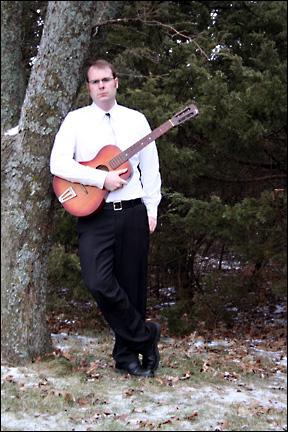 The lyrics are absolutely brilliant. In the aforementioned interview for Sepiachord Christian Williams develops his views on the themes in the lyrics: "Like most folks, I've experienced the ups and downs of love and I don't know if I have any new insights on that subject. But when it comes to death, all we know for sure is that it's going to happen – what happens next is anyone's guess. I see a lot more opportunity for new ideas with that subject than any other. On a personal level, I find the concept of death fascinating and probably think about it too much. When I was younger, religion always had a quick, clean answer to what happens to us when we die. But when I outgrew the faith of my childhood, those answers no longer made any sense to me and I had to start asking questions all over again. Writing songs helps me organize those questions in my head and analyze whatever answers I come up with. Aside from that, if you're trying to figure out a good way to end a song, nothing beats death in some form or fashion." In the email Christian Williams develops his views on the creative process when it comes to finding themes, moods and expressions: "Sometimes I’m fortunate and the lyrics pour out on the page without any coaxing. Other times, I’ll have to write a lot of lines, rewrite, delete, and move them around until I’m satisfied. If I find myself having to think too much, though, I’ll put the song aside and work on something else. I find that the more mental effort I have to put into anything creative, the further I get from the original burst of subconscious inspiration that made it a good idea in the first place. It’s all about finding a balance between feeling and thinking. As for finding the right mood and expression, I consider the songs I end up finishing and sharing to be reflections of my soul from a particular moment in time. I find it fascinating to think about mortality and my place in the universe, so those themes come through my music quite a bit. I can and have written “happy” songs about conventional themes like love, but I’m most interested in the aspects of humanity that people shy away from or find uncomfortable. I believe it’s only through exploring those themes (or exorcising those demons) that we can experience the fullness of life and truly appreciate our existence and our collective place in the universe."
The lyrics are absolutely brilliant. In the aforementioned interview for Sepiachord Christian Williams develops his views on the themes in the lyrics: "Like most folks, I've experienced the ups and downs of love and I don't know if I have any new insights on that subject. But when it comes to death, all we know for sure is that it's going to happen – what happens next is anyone's guess. I see a lot more opportunity for new ideas with that subject than any other. On a personal level, I find the concept of death fascinating and probably think about it too much. When I was younger, religion always had a quick, clean answer to what happens to us when we die. But when I outgrew the faith of my childhood, those answers no longer made any sense to me and I had to start asking questions all over again. Writing songs helps me organize those questions in my head and analyze whatever answers I come up with. Aside from that, if you're trying to figure out a good way to end a song, nothing beats death in some form or fashion." In the email Christian Williams develops his views on the creative process when it comes to finding themes, moods and expressions: "Sometimes I’m fortunate and the lyrics pour out on the page without any coaxing. Other times, I’ll have to write a lot of lines, rewrite, delete, and move them around until I’m satisfied. If I find myself having to think too much, though, I’ll put the song aside and work on something else. I find that the more mental effort I have to put into anything creative, the further I get from the original burst of subconscious inspiration that made it a good idea in the first place. It’s all about finding a balance between feeling and thinking. As for finding the right mood and expression, I consider the songs I end up finishing and sharing to be reflections of my soul from a particular moment in time. I find it fascinating to think about mortality and my place in the universe, so those themes come through my music quite a bit. I can and have written “happy” songs about conventional themes like love, but I’m most interested in the aspects of humanity that people shy away from or find uncomfortable. I believe it’s only through exploring those themes (or exorcising those demons) that we can experience the fullness of life and truly appreciate our existence and our collective place in the universe."
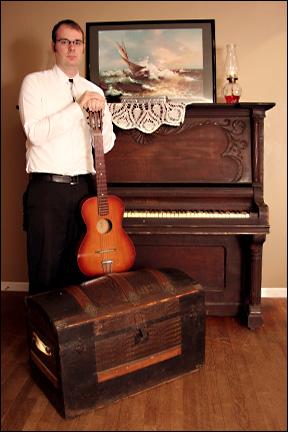 The lyrics, in brief, deals with good and evil, death, infidelity, temptation, about the choices we make and the consequences they lead to. I'm not going to burden this article with examples of his lyrics. It would namely be an article in itself. The lyrics are easily available on his website. One shudders and is fascinated by the lyrics. One shudders of the content and is fascinated by the distinct expression ability. But it’s not only cautionary tales and dark stories. Some of his songs, such as Lady Laudanum, A Winter Away, Troubadour and Lake Effect, is just infinitely beautiful. Christian Williams has by far the best singing voice, a dark baritone, in the whole genre. He sings moreover, without any accompaniment in the song "Too Late" on the fourth album "To The Trees". There is probably no other artist / band in the genre who would dare to make makes such a thing. Christian Williams makes, as I mentioned above, a little of the one and the other. But if we restrict ourselves to the music and focus on what he prefers: to write and record music on his own or to appear before an audience? In the email, he develops his views on the two different ways of expression: "I’m definitely more interested in the creative process. The “center of attention” aspect of performing has never been that appealing to me; if I can just write music and deliver it straight to people who want to hear it, I’m a happy man. And I should be clear that I have no problem getting up in front of people and performing, it’s just that the messages I’m trying to share through my music don’t require a stage and a microphone. My most profound reactions to music occur when I’m listening alone in my car or through headphones, so I think I’ve written my music to be appreciated in the same way. Some settings lend themselves to that kind of experience (coffee houses and small house concerts), but I’ve never really felt like my music is a good fit for conventional live venues, and I’ve never really enjoyed trying to fit my music into those parameters. That all said, if anyone ever asks me to pull out my guitar or banjo and play a few tunes, I never turn them down."
The lyrics, in brief, deals with good and evil, death, infidelity, temptation, about the choices we make and the consequences they lead to. I'm not going to burden this article with examples of his lyrics. It would namely be an article in itself. The lyrics are easily available on his website. One shudders and is fascinated by the lyrics. One shudders of the content and is fascinated by the distinct expression ability. But it’s not only cautionary tales and dark stories. Some of his songs, such as Lady Laudanum, A Winter Away, Troubadour and Lake Effect, is just infinitely beautiful. Christian Williams has by far the best singing voice, a dark baritone, in the whole genre. He sings moreover, without any accompaniment in the song "Too Late" on the fourth album "To The Trees". There is probably no other artist / band in the genre who would dare to make makes such a thing. Christian Williams makes, as I mentioned above, a little of the one and the other. But if we restrict ourselves to the music and focus on what he prefers: to write and record music on his own or to appear before an audience? In the email, he develops his views on the two different ways of expression: "I’m definitely more interested in the creative process. The “center of attention” aspect of performing has never been that appealing to me; if I can just write music and deliver it straight to people who want to hear it, I’m a happy man. And I should be clear that I have no problem getting up in front of people and performing, it’s just that the messages I’m trying to share through my music don’t require a stage and a microphone. My most profound reactions to music occur when I’m listening alone in my car or through headphones, so I think I’ve written my music to be appreciated in the same way. Some settings lend themselves to that kind of experience (coffee houses and small house concerts), but I’ve never really felt like my music is a good fit for conventional live venues, and I’ve never really enjoyed trying to fit my music into those parameters. That all said, if anyone ever asks me to pull out my guitar or banjo and play a few tunes, I never turn them down."
Christian Williams has released eight albums, of which five albums form the basis for my compilation. The albums are described in the following poetic way on the reputable site cdbaby that distributes his albums. "For My Mind, It Was Flying" (2006) - "Songs about love, last wishes, and finding the sun through the clouds", "Built With Bones" (2007) - "13 songs of gothic country, inspired by mortality, the Book of Revelation and the dark side of love", "Defiant" (2007) - "Dark country/folk music from the prairie featuring Gothic tales, toe-tapping lamentations and epitaphs" [They come from a place where tornadoes reunite lost lovers, where evil men turn into cockroaches, and where the down-and-out still manage to crack a crooked smile and stand with a defiance that only comes when you have nothing left to lose.], "To The Trees" (2007) - "14 songs of dark country/folk about the paths we take and the choices we make" and "Thirty Minutes With Christian Williams" (2008) - "A protest folk album from the one of the mainstays in the gothic Americana genre". In addition, there exist two albums that are only released in digital compressed format, "The Long Winter vol. 1 B-sides And Alternate Takes" (2008) and "The Long Winter vol. 2 Under The Influence - Covers" (2009). Christian Williams was kind enough to look up the original files, burn them to a CD and send them to me. Now, "The Long Winter" vol. 1 and 2 are safely placed in my record shelves. The production also includes a concept album "Songs of the Iron Men" (2009). Christian Williams has written the music for 12 poems about steam engines. The poems were released in the 1950s (by the journal Iron Men whose readers consisted of steam engine enthusiasts). I have all albums. "Built With Bones", "Defiant" and "To The Trees" are three great albums, notably "Built With Bones". It’s a masterpiece. It is, of course, also the album that is most difficult to find. On the verge of impossible.
 The logo above is part of a mural (Tragic Prelude) by John Steuart Curry. The painting depicts the abolitionist John Brown and can be found in the Kansas State Capitol in Topeka, Kansas.
The logo above is part of a mural (Tragic Prelude) by John Steuart Curry. The painting depicts the abolitionist John Brown and can be found in the Kansas State Capitol in Topeka, Kansas.
CD is my preferred format. Readers of this article series have been able to follow my trials and tribulations (and moments of joy) when it comes to searching and finding rare albums. In other articles I have highlighted the problem: small editions released on small record labels that often no longer exist, the re-releases are zero, and I find myself at least 5000 km from the local market. In this case, the level of difficulty ratcheted up another few notches. We speak of "Built With Bones" made in only 200 copies by Christian Williams personally. The album is totally (and I mean totally) out of print and there is no secondary market. I repeatedly encountered the following answer in my trawls on the Internet "currently unavailable". It could as well have stood "permanently unavailable". I searched for the album for a very long time. No success. I've even emailed Christian Williams and asked if he was against all odds had any copy left. No answer. Dejected, but not (yet) down and out. Set to live a life without the physical album I (temporarily) resigned and bought the album digitally (FLAC format) on Bandcamp. It was a second-best solution. At least it was uncompressed format. The payment information contained another email address to Christian Williams. I emailed again, without really having any high hopes. But what happens? Christian Williams replied directly. He had one copy left that I could buy. After a few weeks the rarity "Built With Bones" stood in my record shelves. The album is congenial. Christian Williams is less satisfied with the final product. In the interview for Sepiachord Christian Williams explains: "Built with Bones" was a labor of love. I enjoyed every aspect of hand-making the 200 copies of that album but it ended up being very costly in terms of time and money. I was also disappointed that with all of the work I put into making that album, it still didn't look like much more than a glorified CD-R because of the limitations of my computer and printer." With that said, it’s a masterpiece (also the album cover).

My tiresome nagging about the CD format in general and uncompressed files in particular is entirely based on my own and purely selfish needs. The needs have a unilaterally demand perspective. I actually haven’t spent so much time on reflecting over the supply side. I realize, of course, that digital distribution is both much simpler and cheaper, but couldn’t the artists/bands think of me, a loyal and faithful buyer of plastic? I realize also, of course, that the day is approaching when there no longer will be any new cd. It has already happened here and there in "gothic country" genre due to purely economic reasons. Some artists/bands have begun to distribute mainly through digital channels, but still make a limited number of physical cds. The cause that are dragging down the pace of this development is that a, not insignificant, proportion of "gothic country" buyers (like myself) still want something physical (plastic) to hold. Christian Williams has an interesting perspective that actually gave me a little deeper understanding of the supply side and perspective on the choices that are made. In the email, he develops his view on the issue whether digital distribution is positive, neutral or negative for "gothic country": "Personally, I think digital distribution has had a fantastic effect on gothic country. Let’s be honest: this type of music is an acquired taste. I don’t see a lot of major record labels knocking on our doors to get this music out to the masses. It’s always going to be an underground scene, and I think that’s what makes it so interesting. So, understanding that there isn’t a lot of mainstream appeal for this music (or anything else on the creative fringe), it’s up to the individual artist to get the word out about their art. Today’s internet is a wonderful place to do that because it’s geared toward the do-it-yourself artist. Everything from making music, recording music, to selling music can be done by one person in their home, and there are a lot of great websites out there that offer affordable ways to reach the public. It’s art democratization at its finest."
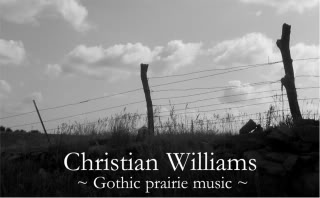 What to make of the future of Christian Williams? "Thirty Minutes With Christian Williams" was released in November 2008. The concept album "Songs Of The Iron Men" was released the year after. Is it possible that there will be more "gothic country" albums from him? In the email he announces the following: "I don’t currently have any plans to release another gothic country or folk album, but I may in the future. Since the 2009 release of my last album, Songs of the Iron Men, I’ve looked for other creative ways to explore the same themes as I did through my folk music, specifically through my art as well as through experimental music. My latest solo work is electroacoustic and acousmatic sound art that utilizes layered acoustic loops and field recordings. I realize it’s a lot different than the music people have come to know me by, but I’ve always been interested in experimental approaches to making music, and I’m finding it to be a really satisfying creative outlet for me these days. I just released a free EP called “Disruptor” that features three of my earliest experimental works, and it’s available for free download." A caveat is in place. Christian Williams expresses it as: "it’s a lot different than the music people have come to know me by". It’s an understatement of biblical proportions. I actually had a very hard time to comprehend that it’s the same artist. The music sounds like Karlheinz Stockhausen meets Brian Eno. It’s in itself very innovative and exciting, but not really my type of music. But the new direction shows the brilliance and versatility. Within five months he has released five albums (!), Disruptor (2013), Commutications (2013), Color Field (2014), Dog Day Suite / Spaces (2014) and Lawrence, Kansas (2014). It is, of course, a pity that there’s no plan for a new "gothic country" album. But, I have great respect for Christian Williams and the choices he makes. You also need to have a little perspective on the matter. With a total of eight albums, he belongs forever in the "Gothic Country Hall Of Fame" (if such an establishment should exist). Readers of this article may think that I have praised Christian Williams. Are all adjectives really justified? The answer is yes. Is there no negative aspect of Christian Williams’ music? Well, if I really try hard (and I mean really try hard) to find something to complain about, then some occasional song can be a bit bland. The song doesn’t speak directly to the listener in the same way as, for example, the songs in the CD compilation below. It should be emphasized that this is a marginal remark on an otherwise perfect production.
What to make of the future of Christian Williams? "Thirty Minutes With Christian Williams" was released in November 2008. The concept album "Songs Of The Iron Men" was released the year after. Is it possible that there will be more "gothic country" albums from him? In the email he announces the following: "I don’t currently have any plans to release another gothic country or folk album, but I may in the future. Since the 2009 release of my last album, Songs of the Iron Men, I’ve looked for other creative ways to explore the same themes as I did through my folk music, specifically through my art as well as through experimental music. My latest solo work is electroacoustic and acousmatic sound art that utilizes layered acoustic loops and field recordings. I realize it’s a lot different than the music people have come to know me by, but I’ve always been interested in experimental approaches to making music, and I’m finding it to be a really satisfying creative outlet for me these days. I just released a free EP called “Disruptor” that features three of my earliest experimental works, and it’s available for free download." A caveat is in place. Christian Williams expresses it as: "it’s a lot different than the music people have come to know me by". It’s an understatement of biblical proportions. I actually had a very hard time to comprehend that it’s the same artist. The music sounds like Karlheinz Stockhausen meets Brian Eno. It’s in itself very innovative and exciting, but not really my type of music. But the new direction shows the brilliance and versatility. Within five months he has released five albums (!), Disruptor (2013), Commutications (2013), Color Field (2014), Dog Day Suite / Spaces (2014) and Lawrence, Kansas (2014). It is, of course, a pity that there’s no plan for a new "gothic country" album. But, I have great respect for Christian Williams and the choices he makes. You also need to have a little perspective on the matter. With a total of eight albums, he belongs forever in the "Gothic Country Hall Of Fame" (if such an establishment should exist). Readers of this article may think that I have praised Christian Williams. Are all adjectives really justified? The answer is yes. Is there no negative aspect of Christian Williams’ music? Well, if I really try hard (and I mean really try hard) to find something to complain about, then some occasional song can be a bit bland. The song doesn’t speak directly to the listener in the same way as, for example, the songs in the CD compilation below. It should be emphasized that this is a marginal remark on an otherwise perfect production.
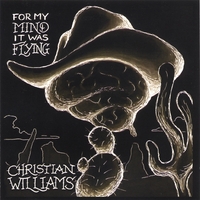 |
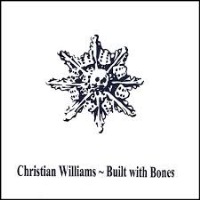 |
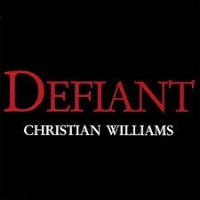 |
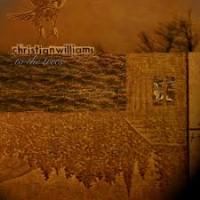 |
 |
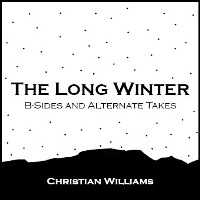 |
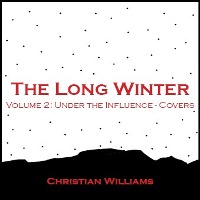 |
 |
Below is a suggestion for a CD compilation.
|
No |
Song |
Album |
|
1 |
For My Mind, It Was Flying |
For My Mind, It Was Flying |
|
2 |
Rattle Trap |
Built With Bones |
|
3 |
Last Thing I Do |
Built With Bones |
|
4 |
Red |
Built With Bones |
|
5 |
Beneath The Branches Dancing |
Built With Bones |
|
6 |
The Long Drop |
Built With Bones |
|
7 |
In The Corner Of Your Eye |
Defiant |
|
8 |
Laudanum Lady |
Defiant |
|
9 |
Summer Breeze |
Defiant |
|
10 |
The Sad Song Of Sequin Island |
Defiant |
|
11 |
Henry May |
Defiant |
|
12 |
Upstairs |
Defiant |
| 13 |
Blood And Tears |
Defiant |
| 14 |
The Barn By The Creek |
Defiant |
| 15 |
Bison Jump |
To The Trees |
| 16 |
Troubadour |
To The Trees |
| 17 |
The Trail |
To The Trees |
| 18 |
Flood |
To The Trees |
| 19 |
When The Smoke Clears |
To The Trees |
| 20 |
Lake Effect |
To The Trees |
| 21 |
Chaos |
Thirty Minutes With Christian Williams |
| 22 |
Empire |
Thirty Minutes With Christian Williams |
| 23 |
Cora |
The Long Winter B-sides and Alternate Takes |
| 24 |
Shake The Dust |
The Long Winter B-sides and Alternate Takes |
Best album: Built With Bones
Best songs: For My Mind, It Was Flying, Rattle Trap, Last Thing I Do, Red, Beneath The Branches Dancing, The Long Drop, In The Corner Of Your Eye, Laudanum Lady, The Sad Song Of Sequin Island, Henry May, Upstairs, The Barn By The Creek, Troubadour, The Trail, Flood, Lake Effect, Empire
